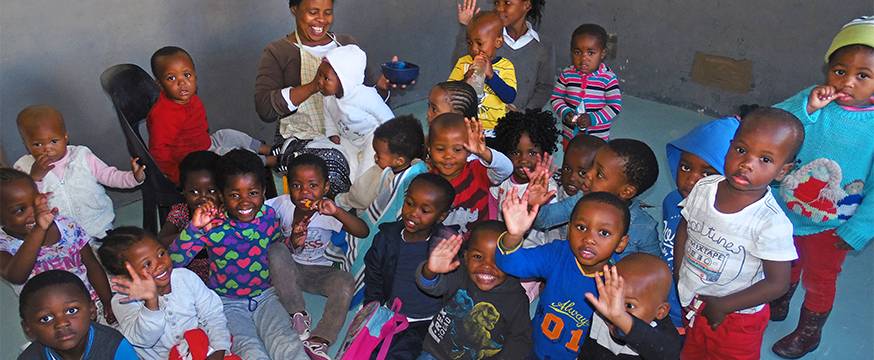
Using evidence to make a difference to young children’s learning
Research 5 Sep 2019 5 minute readACER has reviewed the effectiveness of early childhood education and care interventions in low and middle-income countries to support decision-makers and project teams to plan future interventions. Kashfee Ahmed reports.
It is universally accepted that early childhood education and care (ECEC) can have a significant impact on a child’s lifelong learning. Many low and middle-income countries present programs to parents, the community and children to improve children’s learning outcomes in the years before formal schooling. With funding from the Australian Department of Foreign Affairs and Trade (DFAT), ACER’s Centre for Global Education Monitoring (ACER-GEM) sought to collate these interventions and use the existing data differently to inform planning on future interventions and research.
The ACER-GEM team reviewed 109 studies conducted over a 20-year period, from 1998 to 2017, in a spread of geographic regions. Included studies had to have examined the effectiveness of the interventions and measured children’s learning outcomes, which could include cognitive, socio-emotional, language and motor development. The rich qualitative information about why specific interventions were chosen, how they were implemented in countries and what made them work were the main foci of the report.
The studies included in the review were grouped into six categories which aligned with a 2017 meta-analysis of ECEC interventions in low and middle-income countries by Rao et al.
- income supplementation (8 studies) – cash transferred to parents to combat the effects of poverty on learning
- parent-focused (37 studies) – changing parents’ behaviour to improve learning outcomes for the child
- child-focused education and nurturing care (35 studies) – direct support to the child through either centre- or home-based ECEC services to support learning
- integrated interventions (4 studies) – coordinated services delivered in an unified manner to maximise effectiveness
- quality (20 studies) – improving quality of an existing ECEC intervention
- comparative (5 studies) – compared the impact of multiple types of interventions (such as child-focused and parent-focused programs).
The results for each type of intervention were categorised by their effectiveness and by their applicability to different contexts. The studies showed wide variation in the ways that children’s learning is defined and assessed. Across the 109 studies, 46 different instruments were used, showing that there is a need for a reliable, low-cost and fit-for-purpose measure of young children’s learning that can be used consistently in diverse international contexts and allow for the effects to be compared.
Results from the review showed that it is better to do something rather than nothing when it comes to ECEC; all types of interventions, if of a certain quality, can have a positive impact on early childhood development. Results also indicated that programs that can leverage existing resources within communities to support children’s learning have great value. For example, programs that enhance parenting practices can strengthen foundations for early learning, without the costs associated with more expensive centre-based programs. The review also found that, at the most basic level, direct income supplementation interventions can help to address barriers to early learning in the home environment, while at the other end, integrated programs demonstrate that the most effective support for early learning requires a whole-of-community approach.
Findings from the review confirm that robust research has been conducted over a breadth of contexts. A summary map of the evidence, created using 3ie software, presents the studies by type of intervention, DFAT region, year of publication and the age group of children participating in the intervention.
Some of the action points derived from the research were:
- build the evidence base on ECEC interventions in the Pacific
- focus on the measurement of learning outcomes as the evidence of the impact of interventions on children’s learning
- increase the uptake of robust, cost-effective and fit-for-purpose measures of children’s learning
- expand the evidence base on the effectiveness of income supplementation programs and the ways in which family income affects learning
- deepen the evidence base in relation to parent-focused interventions – by identifying specific programs that contribute the most to a program’s effectiveness and can be replicated when scaled up
- explain how impact occurs in child-focused ECEC interventions and improve understanding of optimal delivery options to meet the needs of diverse communities.
Generally, economically developing nations can learn much from each other by transferring and adapting effective interventions and by continuing to adapt relevant interventions and research tools from the economically developed world.
Further information:
Insights from the scoping review have been captured in the following Policy Notes:
- Measurement of young children's learning for program evaluation
- Effective child-focused education and nurturing care interventions
- Parent-focused interventions in economically developing countries
- Income supplementation interventions in economically developing countries
- Quality-focused interventions in early childhood education and care (ECEC) in economically developing countries
- Integrated interventions in early childhood education and care (ECEC) in economically developing countries
Read the full report:
Improving young children's learning in economically developing countries: What works, why, and where? by Jen Jackson, Syeda Kashfee Ahmed, Toby Carslake and Petra Lietz, Australian Council for Educational Research, 2019.
